Matt Rees's Blog - Posts Tagged "omar-yussef"
Writer is pro-Palestinian and pro-Israeli
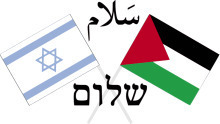 The best thing about moving from journalism to fiction writing is that people show you more respect.
The best thing about moving from journalism to fiction writing is that people show you more respect.As a journalist covering a troubling issue like the Israel-Palestinian conflict, I was often subject to rather nasty verbal attacks during public speaking engagements. For a partisan of either side, I seemed a fine target for their generalized contempt—they thought journalists were all against them and here was a live reporter on whom they could vent their spleen.
Thankfully that doesn’t happen now that I’m the author of a series of Palestinian crime novels. I wasn’t sure that it would be different, but it turns out that there’s a big change in the way people behave toward me.
Here are two examples from the last week alone.
In Cologne, Germany, last week, I talked in a bookstore at the invitation of the Cologne-Bethlehem Association. Much of the audience was made up of middle-aged and older Germans who visit Bethlehem frequently and have made strong ties with the people there.
One older gentleman suggested that, because my first novel THE COLLABORATOR OF BETHLEHEM shows the corruption and extortion carried out by the gunmen of the town during the intifada, my book “tended toward Israeli propaganda.”
But the old fellow was very respectful and as I answered him I could tell he was listening. (My response, of course, is along the lines of “No, actually the book doesn’t even address whether or not it’s right to shoot at Israelis; the book concerns itself with the negative effect those gunmen had WITHIN Palestinian society.”) Listening’s something that was often evidently not happening when, as a journalist, I would talk to audiences.
Then this week I went to the Israeli settlement of Efrat in the West Bank. I’ve visited many times before to write news reports about the confiscation of land or the endless pressure from Washington to stop building in the settlements. This time I was invited by the Gush Etzion Book Group, a few dozen women who live in the local settlements.
There had been quite some fiery debate within the group about whether to have me come and speak to them. Indeed, someone hinted that certain members of the group had stayed away.
Nonetheless, I was glad to be there. After all, much of THE COLLABORATOR OF BETHLEHEM takes place in the village of Artas and the Dehaisha Refugee Camp, which abut the northern reaches of Efrat. I want very much to talk about my books with people who have a stake in the Israeli-Palestinian struggle. Provided they’re willing to listen respectfully, to examine what I’m actually saying and not what they think I’m saying (or what they wish I’d say.)
The evening in Efrat went well and, in fact, much of what we talked about was how little I’m interested in politics—despite the apparently political subject-matter of my novels. What interests me is “the life that remains when politics is sluiced away like the filth a stray dog leaves in the street” (that’s a line from my sleuth Omar Yussef in THE FOURTH ASSASSIN, the next of my novels, which will be published Feb. 1).
Such respectful treatment is a big contrast to situations I encountered as a journalist. Then I would look out over audiences which seemed to be entirely red-faced and with arms crossed over every chest. The hostlie body language didn’t change, even though I was essentially saying the same things I’m saying now. Partisans hate journalists and, I believe, many of them used somehow to detest that I had found a kind of personal peace in covering the very conflict that stirs them up and stresses them so.
In Cologne and Efrat, people heard what I had to say and understood that I’m pro-Palestinian and pro-Israeli. I'd like all the people I know here to have a good life, not the violent situation they suffer. Politics makes people choose sides, and I want no part of that.
I also think choosing sides makes for rather bad novels. It’s in the shades of gray, where decisions are so difficult or even impossible to make, that a novel becomes truly compelling--think of Graham Greene’s best novels. Political journalism on the other hand is, to say the least, dreary. Think of the glib rubbish turned out by columnists who have to fill three op-ed spaces each week.
Who would you respect more—Graham Greene or G. Gordon Liddy? See what I mean?
So I’ll continue to talk about my books to anyone who’ll take the time to read them, because that in itself is a sign of respect and openness. Those, after all, are the qualities most needed by both sides of the Israeli-Palestinian conflict if they’re ever to find peace.
(I posted this first on a joint blog I write with some other international crime writers.)
Published on January 14, 2010 23:21
•
Tags:
bethlehem, book-groups, cologne, crime-fiction, efrat, fiction, g-gordon-liddy, graham-greene, gush-etzion, international-crime-authors-blog, israel, israelis, journalism, koeln, matt-beynon-rees, mystery-novels, omar-yussef, palestine, palestinians, politics, settlements, settlers, the-collaborator-of-bethlehem, the-fourth-assassin, west-bank
In new Palestinian crime novel NYC dangerous as West Bank
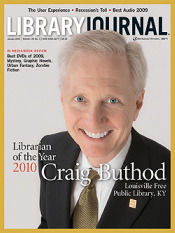 In the current Library Journal, my new Palestinian crime novel, THE FOURTH ASSASSIN (out Feb. 1) gets a good review that highlights the themes and implications beyond the resolution of the mystery. For those who have no copy of the magazine (in which case you may have missed Librarian of the Year -- Way to go, Craig Buthod of Louisville, Ky.) here's THE FOURTH ASSASSIN review: "In New York City for a UN conference, Omar Yussef goes to Bay Ridge, Brooklyn, home to a large Palestinian community, to visit his son and finds a beheaded body in his son's apartment. With no alibi, his son is arrested, and Omar finds that the streets of New York are as treacherous and dangerous as those of Bethlehem. VERDICT Journalist Rees's fourth Omar Yussef outing (after The Samaritan's Secret) exposes the political struggle among various Palestinian factions and demonstrates why it is so difficult to find a solution in the troubled region. His sleuth might miss the ancient streets of Bethlehem, but the hatred and tension of the Middle East follow the Palestinian wherever he goes."
In the current Library Journal, my new Palestinian crime novel, THE FOURTH ASSASSIN (out Feb. 1) gets a good review that highlights the themes and implications beyond the resolution of the mystery. For those who have no copy of the magazine (in which case you may have missed Librarian of the Year -- Way to go, Craig Buthod of Louisville, Ky.) here's THE FOURTH ASSASSIN review: "In New York City for a UN conference, Omar Yussef goes to Bay Ridge, Brooklyn, home to a large Palestinian community, to visit his son and finds a beheaded body in his son's apartment. With no alibi, his son is arrested, and Omar finds that the streets of New York are as treacherous and dangerous as those of Bethlehem. VERDICT Journalist Rees's fourth Omar Yussef outing (after The Samaritan's Secret) exposes the political struggle among various Palestinian factions and demonstrates why it is so difficult to find a solution in the troubled region. His sleuth might miss the ancient streets of Bethlehem, but the hatred and tension of the Middle East follow the Palestinian wherever he goes."
Published on January 19, 2010 05:37
•
Tags:
bay-ridge, bethlehem, brooklyn, crime-fiction, kentucky, library-journal, louisville, manhattan, matt-beynon-rees, middle-east, mystery-fiction, new-york, omar-yussef, palestinian, reviews, the-fourth-assassin, the-samaritan-s-secret, u-n
Matt Rees NY book reading Feb. 2
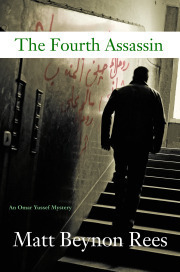 Award-winning crime writer Matt Beynon Rees reads from THE FOURTH ASSASSIN, his new novel, Feb. 2 in New York.
Award-winning crime writer Matt Beynon Rees reads from THE FOURTH ASSASSIN, his new novel, Feb. 2 in New York.The fourth installment in Matt's Crime Writers Association Dagger-winning series about Palestinian sleuth Omar Yussef is published Feb. 1. In New York for a UN conference, Omar uncovers an assassination plot. The suspect: his own son. Omar's most personal investigation so far.
Matt will read from the book Feb. 2 at 7 p.m.
Location: Partners & Crime bookstore, 44 Greenwich Avenue (note, it's on Greenwich Avenue, not Greenwich Street), in Greenwich Village, NYC
Matt Beynon Rees is the award-winning author of the Omar Yussef series. A prize-winning journalist, he has reported for 14 years from the Middle East for Time, Newsweek and British newspapers. His novels have been translated into 23 languages. He lives in Jerusalem.
Read more about THE FOURTH ASSASSIN. Watch a video about the book. Order it from amazon.com or from amazon.co.uk. For publicity contact Grace McQuade (212) 446-5101 gmcquade@goldbergmcduffie.com
Published on January 24, 2010 04:00
•
Tags:
book-tour, brooklyn, crime-fiction, crime-writers-association, greenwich-village, matt-beynon-rees, new-york, omar-yussef, palestine, palestinians, partners-and-crime, readings, the-fourth-assassin
Bringing the Mideast to America
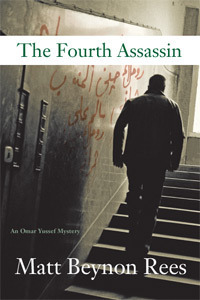 Often a novelist can humanize foreign affairs in ways a journalist can't.
Often a novelist can humanize foreign affairs in ways a journalist can't.To mark publication today of my new Palestinian crime novel The Fourth Assassin, I posted this for my regular column on GlobalPost.
Though we do so at our peril, overseas events are convenient to ignore. We turn past the foreign pages of the newspaper. We might not even get a passport or voyage further than Florida for vacation.
But if we ignore the world beyond our borders, one day that world will come to remind us that it’s there. That’s what happened on 9/11 and in the terror attacks in Madrid and London.
Readers of GlobalPost by definition understand this — it’s why they’ve come to a site which now covers the globe as almost no other U.S. news organization does. Many readers, however, don’t know what important world news they’re missing.
That’s why I decided to bring my fictional Palestinian detective Omar Yussef to the U.S. in my new novel, which is set in Brooklyn. To remind American readers that the Muslim world exists, and that Westerners need to understand how Muslims think. The politics of the Muslim world isn’t just restricted to the Middle East and Asia; it’s in our own towns.
In “The Fourth Assassin,” Omar Yussef comes to New York for a U.N. conference. He visits the Bay Ridge neighborhood of Brooklyn, which these days is becoming known as “Little Palestine” because of the steady influx of immigrants from the West Bank.
Little Palestine isn’t a community of Palestinian intellectual emigres of the kind that emerged in most major Western capitals during the 1970s. It’s a new wave of mostly young men who come to drive taxis and work several jobs, until they can afford to bring their families over to join them. Theirs is the typical American immigrant story, in fact. Except for the FBI investigations.
After 9/11, the FBI cottoned to the fact that there were Palestinians in Bay Ridge. According to community leaders and Brooklyn media, agents went into Little Palestine, recruiting their own operatives and coming away with alleged links between prominent local Palestinians and violent groups back home, such as Hamas.
The Bureau didn’t uncover any broad conspiracy in Little Palestine. But its actions added to the tension between New Yorkers and local Arabs after the attack on the Twin Towers. That’s the situation into which I wanted to place Omar Yussef, a Muslim with an often unconventional political take. Mutual distrust makes for a good crime novel. It also happens to be real.
The conflict between the West and the Muslim world today is much like the Cold War of decades past. I’d wager that few people read the nonfiction written about the confrontation with the Soviet Union any more. But some of the best fiction about that time, say John Le Carre’s Smiley novels or books like Martin Cruz Smith’s “Gorky Park” which went deep into Russian society during those years, still speak to us even though that battle is long finished.
That’s because those books examine a time of conflict in a timeless way. By humanizing all the participants in the conflict, those novels go beyond nonfiction and give us a window into the minds of those people who’d otherwise seem to us inhuman enemies. I hope “The Fourth Assassin” does that, too.
When Omar arrives in Bay Ridge, he finds a headless body in his son’s bed. The gruesome discovery leads him to uncover a suicidal assassination plot that seems to involve some of his former pupils in his school in Bethlehem. One of the suspects: his own son.
Much of what goes on in the novel stays within the Palestinian community, most of which came from the village of Beit Hanina on the border between Jerusalem and Ramallah. These immigrants fled the violence of the intifada and, over the last decade, moved into a neighborhood that had traditionally been Norwegian and Irish.
These days Little Palestine is dotted with basement mosques, Arab restaurants and boutiques selling slinky headscarves for religious Muslim women who want to observe the signs of their faith while also highlighting their beauty.
But the novel also takes Omar to Atlantic Avenue and Coney Island — iconic areas of Brooklyn we might be more accustomed to seeing in traditional thrillers, though they now have strong Arab presences. I put those locations into my novel so that readers would understand that the politics of the Middle East can’t be isolated. You can take the N train from Times Square and get off in Palestine.
I hope “The Fourth Assassin” will help readers understand that.
Published on February 01, 2010 06:16
•
Tags:
matt-beynon-reees, middle-east, new-book, new-york, omar-yussef, palestine, publication-date, terrorism, the-fourth-assassin, ttle-palestine, twin-towers, united-nations
Palestine Scene of the Crime
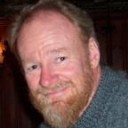 Crime writer J. Sydney Jones has a new blog called Scene of the Crime. He aims to interview writers about the impact on their writing of the location and sense of place in their novels -- usually from far-flung countries. This week he features me on my Palestinian crime novels. Read on, for the full interview.
Crime writer J. Sydney Jones has a new blog called Scene of the Crime. He aims to interview writers about the impact on their writing of the location and sense of place in their novels -- usually from far-flung countries. This week he features me on my Palestinian crime novels. Read on, for the full interview.A Different View of Palestine
Matt Beynon Rees has staked out real estate in the Middle East for his acclaimed Crime Writers Association Dagger-winning series of crime novels featuring Palestinian sleuth Omar Yussef. The books have sold to publishers in 23 countries and earned him the title “the Dashiell Hammett of Palestine” (L’Express).
His newest, The Fourth Assassin, which is out on Feb. 1, finds Yussef in New York for a UN conference and visiting his son, Ala, who lives in Bay Ridge, a Brooklyn neighborhood with a large Palestinian community. Of course murder and mayhem greet Yussef in New York, just as in Palestine, and he is ultimately forced to investigate in order to clear his son of a murder charge.
Scene of the Crime caught up with Matt in New York, where he is promoting his new book. He was kind enough to take time away from his busy schedule to answer a few questions.
Describe your connection to Jerusalem and Palestine. How did you come to live there or become interested in it?
I arrived in Jerusalem for love. Then we divorced. But I stayed because I felt an instant liking for the openness of Palestinians (and Israelis). When I arrived I had just spent five years as a journalist covering Wall Street. Frankly that exposed me to a far more alien culture than I experienced when I became a foreign correspondent in the Middle East. People in the Middle East are always so eager to tell you how they FEEL; on Wall Street no one ever talked about feelings, just figures. Rotten material for a novel, figures are. I’ve lived now 14 years in Jerusalem.
What things about Palestine make it unique and a good physical setting in your books?
Palestine is a place we all THINK we know. It’s in the news every day. Yet the longer I’ve been there, the more I understand that the news shows us only the stereotypes of the place. Terrorism, refugees, the vague exoticism of the muezzin’s call to prayer. What better for a novelist than to take something with which people believe themselves to be familiar and to show them how little they really know. To turn their perceptions around. The advantage is that I begin from a point of some familiarity – it isn’t a completely alien location about which readers know nothing. Imagine if I’d set my novels in, say, Tunisia or Bahrain. Not far from where my novels take place, but much more explanation needed because they’re rather a blank. With Palestine, I’m able to manipulate and disturb the existing knowledge of the place we all have.
Did you consciously set out to use Palestine as a “character” in your books, or did this grow naturally out of the initial story or stories?
I arrived in Jerusalem as a journalist, but I’ve felt that I’m on a vacation every day of those 14 years I’ve lived there. Every minute I spend in a Palestinian town or village, my creative senses are heightened, to the point where it becomes quite exhausting. Part of that is because of the people, the way they speak and feel. But most of it is the experience of place. The light so bright off the limestone. The smells of spices and shit in the markets. The cigarette smoke and damp in the covered alleys. It’s important to note that each Palestinian town is extremely distinctive – which might not be evident from the news. My first novel takes place in the historic town of Bethlehem. The second is in Gaza, which seems like another world. Nablus, where the third book is set is an ancient Roman town, built over by the Turks. …My new novel sees my Palestinian detective Omar Yussef come to Brooklyn. I move him around BECAUSE place is the driver of the novels. The main characters are the same; but I draw something different out of each of them by shifting them to new places.
How do you incorporate location in your fiction? Do you pay overt attention to it in certain scenes, or is it a background inspiration for you?
The texture of a Palestinian town is so rich, it ends up defining the atmosphere of the novel. With the casbah of Nablus for example: I was stuck in its old alleys during the intifada with gunfire all around, not knowing who or what might be round the next corner, and it seemed so sinister and beautiful at the same time. The locations are more than background. They’re significant because I write about Palestinian culture and society and people, in the context of a mystery. You couldn’t take my mysteries and change the names and put the Golden Gate in the background and say they were set in San Francisco. They’re the books they are because Palestine is as it is.
How does Omar Yussef interact with his surroundings? And conversely, how does the setting affect him?
Omar Yussef, my detective, is based on a friend of mine who lives in Dehaisha Refugee Camp in Bethlehem. It’s important to me that he should be a Muslim, someone who loves his traditional family life and tribe, someone who belongs very deeply to Bethlehem. That’s because I’m trying to show readers what they’re missing when they see the Palestinians only as stereotypical terrorists or victims. His reaction to the chaos around him is that of an honorable man who finally is driven to stand up against the negative forces at work in his town.
Has there been any local reaction to your works? What do local Palestinian and Israeli reviewers think, for example. Are your books in translation in Palestine, and if so, what reaction have they gotten from reviewers?
Hanan Ashrawi, a former Palestinian peace negotiator and a leading political figure, said of The Collaborator of Bethlehem that “it reflects the reality of life in Bethlehem– unfortunately.” (After all, it’s a crime novel of exceeding chaos.) I get a lot of emails from Arabs noting that I’m showing the reality of their people in a way that isn’t reflected in Arab media – which just blames Israel for everything – or in Western media, where the Palestinians are usually just stereotypes set in opposition to Israel. Translation into Arabic is a slow business – Henning Mankell sold 40 million books before he got an Arab translation last year – but I’m hopeful. Meanwhile the first book was translated into Hebrew and got good reviews. Israelis were very glad to have an opportunity to learn about life beyond the wall that they’ve built between Jerusalem and Bethlehem.
Of the novels you have written set in Palestine, do you have a favorite book or scene that focuses on the place? Could you quote a short passage or give an example of how the location figures in your novels?
In my third novel. The Samaritan’s Secret, there’s a scene in an old palace in the Nablus casbah called the Touqan Palace. This was the real palace I discovered on my first visit to the West Bank (to cover the funeral of a man who’d been tortured to death in the local jail). I finished my reporting and went for a walk about the casbah. I’d heard about the Touqan Palace and a friendly Palestinian helped me find it. We shouldered open the door, climbed through the goat pen inside, and came into a courtyard strung with cheap laundry and with chickens living in the ornate fountain at the center. The wealthy family that built the palace had moved to a new place up the hillside; now the palace was home to poor refugees. It struck me very powerfully as a political irony. But I also loved the stink of the chickens and the way the goats nuzzled at me and the children who lived there came through the dust to chat with me. I tried to get that feeling of a people estranged from their history into the novels through Omar Yussef, who’s a sleuth but also a history teacher. So the scenes in the Touqan Palace are quite pivotal, thematically, for me.
Who are your favorite writers, and do you feel that other writers influenced you in your use of the spirit of place in your novels?
I love Paul Bowles (The Sheltering Sky, Let it Come Down). He used to travel the Arab world and, each day, would incorporate into his writing something that had happened the previous day as he journeyed. That’s a technique I’ve used. It makes you look sharply at the emotions you experience when you’re in a strange place. In some ways it was most useful when I wrote The Fourth Assassin, which is set in Brooklyn. I know New York very well but I made a great effort to see the place as a new immigrant or a total foreigner might. I discovered that it was daunting and oppressive and crowded and huge and threatening and cold as hell – it actually made me a little depressed. Which was the point of doing my research that way. I think of it as method acting for writers.
Visit Matt at his homepage, and also on his blog. Thanks for the insightful comments, Matt, and good luck with the new book.
Published on February 02, 2010 07:09
•
Tags:
bethlehem, brooklyn, crime-fiction, exotic-fiction, gaza, golden-gate, interviews, israel, j-sydney-jones, jerusalem, matt-beynon-rees, middle-east, nablus, new-york, omar-yussef, palestine, palestinians, san-francisco, the-fourth-assassin, writing
'The Fourth Assassin' takes Page 69 Test
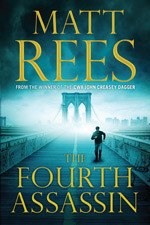 The Campaign for the American Reader blog empire's flagship is the Page 69 Test. The premise of the blog is this: open any book to page 69; if it grabs you, that's a better indication of whether you'll enjoy the book than simply reading the opening page. Try it on a book you like (and, maybe more fun, one you don't), it's pretty reliable. Blogger Marshal Zeringue asked me to submit my new Palestinian crime novel, THE FOURTH ASSASSIN, to the Page 69 Test. Here's his introduction followed by what I wrote for him about page 69 of my new book:
The Campaign for the American Reader blog empire's flagship is the Page 69 Test. The premise of the blog is this: open any book to page 69; if it grabs you, that's a better indication of whether you'll enjoy the book than simply reading the opening page. Try it on a book you like (and, maybe more fun, one you don't), it's pretty reliable. Blogger Marshal Zeringue asked me to submit my new Palestinian crime novel, THE FOURTH ASSASSIN, to the Page 69 Test. Here's his introduction followed by what I wrote for him about page 69 of my new book:Matt Beynon Rees is the author of the acclaimed series of novels featuring Palestinian detective Omar Yussef: The Collaborator of Bethlehem, which won the CWA John Creasey (New Blood) Dagger award, A Grave in Gaza, The Samaritan's Secret, and the newly released The Fourth Assassin.
He applied the Page 69 Test to the new novel and reported the following:
The first three novels in my Palestinian crime series take place in the West Bank and Gaza. All the characters are Palestinian, with the exception of a couple of foreign aid workers. But I want my series to show the full extent of Palestinian life, and half the people in the world who call themselves Palestinian don’t live in Palestine. So my hero Omar Yussef hits the road.
The Fourth Assassin, the new book in my series, takes place in the UN on the east side of Manhattan, and in the section of Bay Ridge, Brooklyn, that’s becoming known as “Little Palestine,” as immigrants from the Jerusalem area make it their home.
Page 69 hits the two main topics that make the book compelling.
First, the alienation felt by a foreigner when confronted with the enormity and chaos of New York. I wanted to show how immigrants might turn inward, rejecting the society around them, becoming religious fundamentalists. Here’s the description of a subway ride from Omar’s point of view:
"The train rumbled at low speed onto the strangely terrifying superstructure of the Manhattan Bridge. Downriver, beyond the massive girders and the mesh of electric lines, the Brooklyn Bridge arched over the water. Its famous towers sprayed thick cables along its span. Omar Yussef felt as though he were flying out of control through the air, high above the river and the tangle of highway along the shoreline. An old Vietnamese man screamed into his cell phone over the noise of the train. The wheels rang like the slow beating of a giant steel kettledrum until the train slipped back under the earth, jumped to a different track, and picked up speed. ‘This is an unnatural way of traveling,’ Omar Yussef whispered."
Second, Page 69 contains an important spark for the mystery at the heart of the book. Up to this point, no one but Omar Yussef acknowledges that things seem awry. But now his sidekick, Bethlehem Police Chief Khamis Zeydan, says to him:
"‘My brother, I have a bad feeling about this visit. Some danger that I can’t predict.’"
Now if that doesn’t hook you, nothing will. Read on to page 70, eh?
Published on February 08, 2010 11:47
•
Tags:
a-grave-in-gaza, bay-ridge, blogs, brooklyn, crime-fiction, exotic-fiction, little-palestine, marshal-zeringue, new-york, omar-yussef, the-collaborator-of-bethlehem, the-fourth-assassin, the-page-69-test, the-samaritan-s-secret, united-nations
Wall St Journal on 'The Fourth Assassin'
While in New York this last couple of weeks, I stopped into the space-age HQ of Rupert Murdoch's News Corp on the Avenue of the Americas in Midtown Manhattan. Once my eyes had adjusted to the superbright white light everywhere, I settled into a studio for an interview with Jon Friedman (the man known around NY as "Mister Media") to talk about how I researched my new novel THE FOURTH ASSASSIN.
Published on February 09, 2010 05:24
•
Tags:
book-research, brooklyn, jon-friedman, marketwatch, matt-beynon-rees, middle-east, new-york, omar-yussef, the-fourth-assassin, the-wall-street-journal, travel, video, writing
Why's a Palestinian sleuth in Brooklyn?
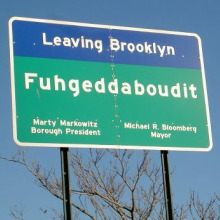 I’ve been called the Dashiell Hammett of Palestine, the John Le Carre of the Middle East, the James Ellroy of…Palestine, the Graham Greene of Jerusalem, and the Georges Simenon of the Palestinian refugee camps. Depends which review you happen to have read.
I’ve been called the Dashiell Hammett of Palestine, the John Le Carre of the Middle East, the James Ellroy of…Palestine, the Graham Greene of Jerusalem, and the Georges Simenon of the Palestinian refugee camps. Depends which review you happen to have read.Until now I’ve published three novels about Omar Yussef, my Palestinian schoolteacher/sleuth. Omar has been described as the Philip Marlowe of the Arab street, the Hercules Poirot of the Near East, Sam Spade fed on hummus, and Miss Marple crossed with Yasser Arafat.
Why then is my new Omar Yussef novel THE FOURTH ASSASSIN,/a> set in New York City? Not in the Middle East, the Near East, Palestine, the Levant, the Fertile Crescent, or any other place where Yasser may be fornicating with dear old Miss Jane Marple.
I lived in New York six years, until I came to Jerusalem in 1996. I know it better than any city outside the Middle East. I had a lot of fun in New York. Maybe too much fun. In no other place in the world can a young man so overindulge in the temptations originally offered in the city of Sodom. Which in reality is close to where I live now in Jerusalem. Though you wouldn’t know it to look at the place.
I know New York with my eyes closed. Literally. In my twenties, after leaving some bar or club, I blacked out on every line on the subway map.
I dated women from every borough of the city, from Westchester and upstate. From the 201 area code (dare I say, New Jersey.)
I married a girl from the North Shore of Long Island, and in my continuing effort to know New York in all its facets, when we divorced, I married a beautiful woman from the South Shore of Long Island.
But each time I returned, no matter how well I thought I knew the place, New York seemed different. The change became most apparent after 9/11. I wanted to understand it through the eyes of Omar Yussef.
That’s why he finds himself in Brooklyn in THE FOURTH ASSASSIN. Visiting the area of Bay Ridge that has become known as “Little Palestine,” for the influx of Palestinian immigrants.
Little Palestine isn’t a community of Palestinian intellectual émigrés, such as sprang up in European capitals in the 1970s. It’s a new wave of young men mostly, saving to bring their families over, working two or more jobs. Theirs is a typical American immigrant story.
Except for the FBI agents going through their trash.
The Bureau didn’t uncover any broad conspiracy in Little Palestine. But it did add to the tensions between the Arab community and other New Yorkers after the attack on the Twin Towers.
That’s the situation into which I wanted to place Omar Yussef. Mutual distrust, after all, makes for good crime fiction.
In Brooklyn, it also happens to be real.
Published on February 11, 2010 23:51
•
Tags:
bay-ridge, brooklyn, crime-fiction, dashiell-hammett, fbi, fertile-crescent, georges-simenon, graham-greene, hercules-poirot, james-ellroy, jerusalem, levant, little-palestine, long-island, middle-east, miss-jane-marple, miss-marple, near-east, new-jersey, new-york, omar-yussef, palestine, palestinians, philip-marlowe, sam-spade, the-fourth-assassin, upstate-new-york, westchester-county, yasser-arafat
Who'll play Omar in the movies...?
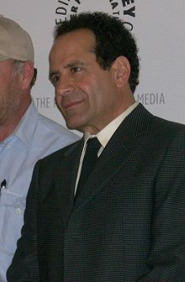 On the My Book, The Movie blog, I was asked to write about who I'd choose to play Omar Yussef in the movies. Here's what I wrote:
On the My Book, The Movie blog, I was asked to write about who I'd choose to play Omar Yussef in the movies. Here's what I wrote:I had no need to think of an actor. Not until I’d finished writing the book. Then the thinking really started.
The Palestinian sleuth who's the hero my books, Omar Yussef, is based on a real Palestinian friend of mine who lives in the Dehaisha Refugee Camp on the edge of Bethlehem in the West Bank. I had no problem visualizing him when I wrote about Omar, because I saw him most days. We spent a lot of time together and, with a gentleman as frequently cantankerous as my real-life chum, believe me, I got the full tour.
Then came publication of the first of my Palestinian crime novels, The Collaborator of Bethlehem. The estimable Marshal Zeringue invited me to write a post for this blog. Instead of having a famous actor always in mind, I had to run through potential candidates.
My wife insisted Pacino was just right for Omar. But I preferred the quiet, gentle Swiss actor Bruno Ganz – who proved he could do cantankerous when he played Hitler a few years ago in Downfall.
At the Leipzig Book Fair last year, my Berlin-based film agent chatted with me about some negotiations with a German tv channel which wanted to make a series based on Omar. As we talked, crowds of local kids dressed in “Manga” costume milled about (apparently this is some Japanese animation thing that has cult dressing-up status among people young enough to make me feel very old.) He asked if I had an actor in
mind for Omar. I mentioned Ganz.
“No, it won’t work,” Roland said.
“Why not?” I asked, as I was bumped from behind by some German kid dressed up as a vampire samurai.
“He’s not Arab. It really ought to be an Arab. But it’s difficult to find an Arab actor who’s well-known enough to carry a production and also speaks German.”
“So Pacino’s out too, I guess.”
“Well, movies are different from tv,” he said, “and if it sold in America, things might be different, too.”
I think they might be different now that The Fourth Assassin has been released. In this new installment of my Palestinian series, Omar comes to New York for a UN conference, only to uncover an assassination plot. The suspect: his own son.
I’d guess the New York setting might make the series seem just that little bit less dauntingly foreign – without betraying its core and making it into just another American detective story.
Which leaves me free to name names.
So here it is: Tony Shalhoub. He showed great dramatic range in The Siege, which was written by Lawrence Wright, a journalist colleague of mine who later won a Pulitzer for The Looming Tower, a nonfiction account of the story behind the 9/11 terrorists. Shalhoub had a nice cameo in 1408, an otherwise typically over the top Stephen King thing. I don’t really watch tv, but I gather Monk is great.
Oh, and I forgot to mention: Tony Shalhoub’s an Arab. He’s descended from Lebanese immigrants.
I hope that’s good enough. I mean, don’t make me find an actor big enough to carry a Hollywood movie who’s actually Palestinian…
Published on February 15, 2010 01:43
•
Tags:
1408, actors, al-pacino, brooklyn, bruno-ganz, crime-fiction, film, lebanese, leipzig-buchmesse, manga, monk, movies, my-book-the-movie, new-york, omar-yussef, palestinian, pulitzer-prize, stephen-king, the-collaborator-of-bethlehem, the-fourth-assassin, the-looming-tower, the-siege, tony-shalhoub
Book of A Lifetime: The King Must Die
 The Independent runs a periodical feature in which it picks authors to write about a book which changed their lives. Last week the London newspaper asked me to write the piece. Here it is:
The Independent runs a periodical feature in which it picks authors to write about a book which changed their lives. Last week the London newspaper asked me to write the piece. Here it is:In early 1999, King Hussein fell sick on his return from cancer treatment in the US. I was Middle East correspondent for The Scotsman. Many colleagues with bigger expense budgets were already in Jordan on death watch. I poked through a second-hand bookshop on a narrow lane in Jerusalem, wondering if I ought to go too.
I picked up a 1958 edition of The King Must Die by Mary Renault. The title seemed like a good joke to share with my fellow hacks. It decided me. I paid a few shekels for it and went off happily to pack for a trip across the Jordan Valley.
Renault took the myth of Theseus and the Minotaur and constructed a novel of the historical circumstances which may have lain behind it. In the novel, the young hero becomes a champion "bull-dancer" in Crete, leaping over charging animals, and escapes to become king in Athens. Renault's sensitive characterisation and historical sense of place hooked me. In her day (she died in 1978) other writers often suggested Renault was really a male homosexual, assuming that a woman couldn't write so vividly about men. I've striven for that depth of empathy in writing about a foreign culture in my novels.
Renault's approach to Greek history shaped my Palestinian crime novels. Writing at a time when frank examinations of contemporary homosexuality – Renault was lesbian – were taboo, she made her readers look again at love between people of the same sex. She placed that love in the context of history and stories we all think we know – the Minotaur, the trial of Socrates, Alexander's conquests – and then forced us to accept that the heroes of that period had a starkly different view of sexuality. In other words, she redirected us from the myth to the reality.
I've tried to do that with the Palestinians, who are stereotyped in the news as victims or as terrorists, and so I have focused instead on real people I've known, aiming to get at the depth of their emotions.
As for Hussein, he succumbed to lymphoma. That night, after deadline, reporters packed the bar of the Intercontinental, sucking on fat Habanas and downing Laphroaig, excited by a get-together with colleagues usually spread across the region. The next day, Hussein's cortege passed through sombre crowds in the wind and rain. I happened to laugh at a remark by another journalist. An old Bedouin turned tearful, red eyes on me. I was ashamed of my laughter. For him, this wasn't a news story or even history. It was the passing of someone who had been important in his life.
It's his emotion that I remember about that day, rather than the newspaper prognostications for the political future of the Middle East, and emotion is the heart of a novel, even a political novel. Throughout the funeral, The King Must Die was in my pocket.
Matt Rees's 'The Fourth Assassin' is published by Atlantic
Published on February 21, 2010 23:05
•
Tags:
alexander-the-great, brooklyn, bull-dancer, crete, crime-fiction, greece, greek-history, homosexual-literature, jerusalem, jordan, jordan-valley, king-hussein, london, mary-renault, middle-east, minotaur, new-york, omar-yussef, palestine, palestinian, socrates, the-fourth-assassin, the-independent, the-king-must-die, the-scotsman, theseus



